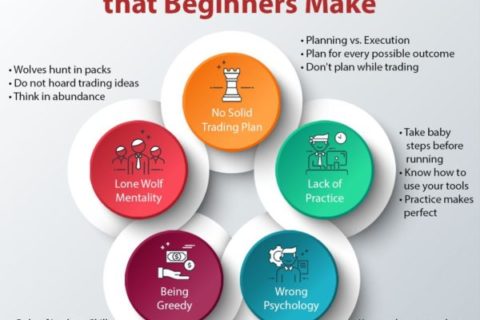
Trading Psychology – Making It Real
Knowing personality traits associated with successful traders and the things they do to succeed in trading does not bring you any closer to achieving success unless you are practicing what you know to be true and are doing it consistently.
The problem is that we humans often know but we don’t do. For successful traders, this ability to “do” is innate and there is no issue. For most, however, “doing” is the challenge that keeps trading success elusive.
The reason is trust. Trading strategies must be based on a foundation of truth to succeed. Good market awareness allows you to “see” the truth more clearly so you have more confidence “doing” and executing the proper tactics.
How do you improve your market awareness and start to take the steps to develop a path to success? Understand yourself better.
Who Are You?
Personality does not just influence how we move and respond in our environment; it also causes us to act in certain ways that are reflected in our trading methods. By understanding your personality, you are better able to modify behaviors that are detrimental to your trading and create a trade plan that supports the behaviors you have.
A personality profile is a knowledge management tool used to evaluate a trader’s personal attributes, values and life skills in an effort to maximize his or her performance. Questions in a personality profile test (available online or from a professional) are designed to seek out information about a trader’s temperament, decision-making methods, trading style, general attitude and commitment toward work, along with quality-of-life considerations.
Then, once you understand your natural skill set, you can find a trading approach to match. For example, a cautious person might prefer long-term trend-following while someone who is more spontaneous might prefer day-trading. Although behaviors can be modified, the core of who you are is difficult to change. Why force yourself to be something that you are not? Rather, develop a plan built to leverage your strengths and support your weaknesses.
One reason a lot of traders struggle is that they believe following a trade plan that works for someone else will work for them. But, that doesn’t happen very often. The reason is that the strategies they are applying are designed around the other trader’s personality not their own. You are unique, and your path to success will be your own.
What Trade Plan Works For You?
A trade plan defines the rules for your trading program. And, aligning it with your personality makes it easier and more enjoyable to follow. Think of it as your trading business plan that allows you to make trading decisions, measure your results and quantify your improvements. No plan will guarantee success. However, a good plan—when you adhere to it—will provide consistency and enable you to stay in the game a lot longer than trying to attempt trading without a plan.
When developing a trade plan, think in terms of your development as a trader, as opposed to thinking of purely financial goals. By developing yourself as trader first, you are able to identify a method that works for you and create a structure that capitalizes on the opportunities presented. Decide how you will achieve your goals. Reward yourself once you do in ways that are specific and meaningful to you.
Importantly, a trade plan is not a trading strategy, although a good plan will always contain a strategy. Rather, a trade plan is one that is tailor-made to suit your personality, ability and resources. It is best to develop your trade plan around three key factors:
- Motivation
- Risk
- Reward
1. Motivation
Why do you want to be a trader?
Sorry. “To make money” isn’t the answer. It’s not personal to you and, therefore, it is not helpful to your trade plan. Everyone wants to make money trading. You have to dig deeper to find your true motivation. And, you might not like what you see.
Maybe you’re motivated by excitement. You’ve seen floor traders on television or in trading rooms in the movies and want that same passion. But excitement unchecked can easily lead to catastrophe. Maybe you’re motivated by greed. You’ve heard stories about traders making exorbitant amounts of money in a single day and want to cash in, too. But uncontrolled greed is often rewarded with overwhelming disappointment. Or, maybe you’re motivated by fantasy. You’ve read about trading via a laptop and sipping champagne in the islands. But fantasy is not reality.
To develop a good trade plan, you must question your true motivations. Are you certain that trading is the right business for you? If you believe that the markets exist for the sole purpose of showering you in vast quantities of easy money – then think again. Trading is NOT an easy option. The effort needed to run a trading business must be respected.
Don’t pretend to be someone you are not. Be honest with yourself to uncover the real motivations, fears and desires that fuel your ambition. Some of these will be helpful while trading, but others will not. Just accept them, though, as thoughts and emotions you have naturally. They aren’t the problem. But, how you allow them to impact your trading could be a problem. Your trade plan will help you measure how much you allow your motivations—both positive and negative—to affect your trading results. To ensure that the effect of your motivation is a profitable one, you must start by examining your real reasons for trading and, hopefully, learn more about yourself in the process.
2. Risk
What is your attitude toward risk? The answer is a good starting point to ensure that your feelings about risk are compatible with your trading style and your trading plan.
Opinions on risk vary. Some traders think of the markets as a hot potato – the longer you hold a position, the greater the chance of getting burned. To these traders, market risk is measured by the amount of time you are in the market. Then, there are many traders who feel much happier and sleep better at night by holding medium to long-term positions.
3. Reward
What are your income targets? It is important to know your financial targets and then break them down into weekly and daily timeframes to see if they are realistic. Needless to say, if your strategies only generate 5% a month, it is counterproductive to have a target of 1% per day. Your targets cannot be idle fantasies; they must be based on results from testing your trading strategy both backwards and forward.
Setting goals is an essential part of succeeding at anything worthwhile. Therefore, income goals are a big part of your trading plan because they provide you not only with a meaningful objective to work toward, but also a way to track your progress.
Putting Your Trade Plan Together
Every trader’s path is unique. Building a trade plan and strategy based on your personality strengths and risk tolerances will provide for the best chance for sustainable success.
Awareness
Improved awareness in how you respond to market conditions gives you insight into developing strategies to capture opportunity. By knowing yourself and your own responses to specific market behavior, you understand the market better and are able to identify shifts in market conditions and implement the correct strategy faster.
Form Your Strategy
Awareness provides a knowledge management tool to develop a strategy by creating a decision template based on truths. The answers to questions like these form the foundation of the strategies you will develop:
- Do you like to trade with momentum or against it?
- If you like to trade against the trend, do you want to take advantage of the initial turn or do you prefer to wait for a confirmed reversal?
- Are you a directional trader, or would you rather base your strategy on volatility movement?
- Do you always need to be “involved,” or do you prefer a more selective strategy that only trades a couple of times a day?
- Do you prefer a mechanical, automated approach or more “seat of the pants” discretionary trading?
Optimize Your Trade Plan
Once the tactics of your strategy have been defined, they must be optimized to current market conditions—and continually reoptimized as market conditions change. For example, if you have a deviation tactic that uses multiple oscillators in different time periods to identify an extremely overbought/oversold reading and works well in sideways markets, great! But, the strategy needs to be modified when markets are trending instead.
Maintaining an objective fact focus is the key to creating a decision template for a robust trade plan. Your trade plan should not only align your tactics with current market conditions, but also your risk/reward parameters.



